小学六年级英语 一般过去时学习资料
- 格式:doc
- 大小:15.38 KB
- 文档页数:2
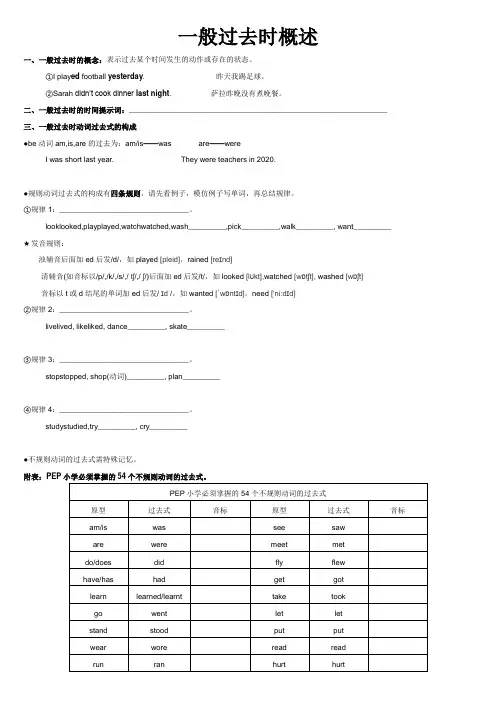
一般过去时概述一、一般过去时的概念:表示过去某个时间发生的动作或存在的状态。
①I play ed football yesterday. 昨天我踢足球。
②Sarah didn’t cook dinner last night. 萨拉昨晚没有煮晚餐。
二、一般过去时的时间提示词:______________________________________________________________三、一般过去时动词过去式的构成●be动词am,is,are的过去为:am/is——was are——wereI was short last year. They were teachers in 2020.●规则动词过去式的构成有四条规则,请先看例子,模仿例子写单词,再总结规律。
①规律1:_______________________________。
looklooked,playplayed,watchwatched,wash_________,pick_________,walk_________, want_________ ★发音规则:浊辅音后面加ed后发/d/,如played [pleid],rained [reɪnd]清辅音(如音标以/p/,/k/,/s/,/ tʃ/,/ʃ/)后面加ed后发/t/,如looked [lʊkt],watched [wɒtʃt], washed [wɒʃt]音标以t或d结尾的单词加ed后发/ɪd /,如wanted [ˈwɒntɪd],need ['ni:dɪd]②规律2:_______________________________。
livelived, likeliked, dance_________, skate_________③规律3:_______________________________。
stopstopped, shop(动词)_________, plan_________④规律4:_______________________________。
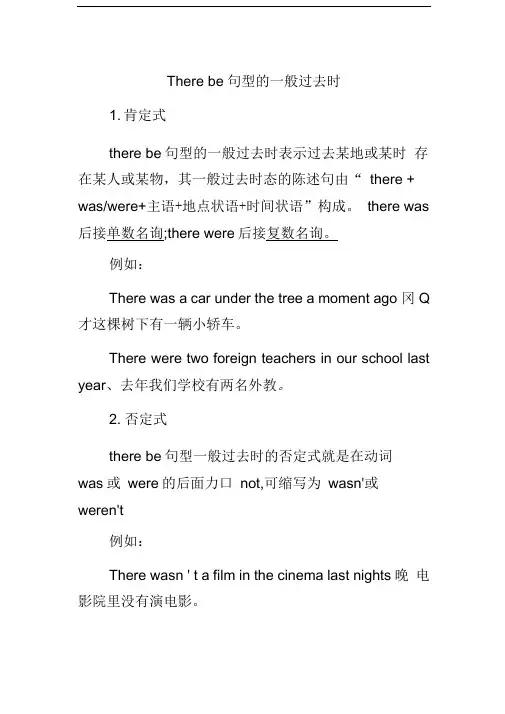
There be句型的一般过去时1. 肯定式there be句型的一般过去时表示过去某地或某时存在某人或某物,其一般过去时态的陈述句由“ there + was/were+主语+地点状语+时间状语”构成。
there was 后接单数名询;there were后接复数名询。
例如:There was a car under the tree a moment ago 冈Q 才这棵树下有一辆小轿车。
There were two foreign teachers in our school last year、去年我们学校有两名外教。
2. 否定式there be句型一般过去时的否定式就是在动词was或were的后面力口not,可缩写为wasn'或weren't例如:There wasn ' t a film in the cinema last nights晚电影院里没有演电影。
There weren ' t any women doctors the挡时没有女大夫。
3. 一般疑问式及其回答there be句型一般过去时的一般疑问式就是将动词was或were放在there之前。
肯定回答用“Yes, thre was/were、;否定回答用“No, there wasr^ ' t weren '、t”。
例如:①一Was there a man in the room just now?冈Q 才房间里有位男子不?—Yes, there was 就是的,有一位。
②一Were there any girl singers in your class last year?去年您们班有女歌手不?—No, there weren、' 不,没有。
4. 特殊疑问式及其回答there be句型一般过去时的特殊疑问式由“疑问词+ was/were+ there+地点状语+时间状语”构成, 有时地点状语与时间状语可省略。
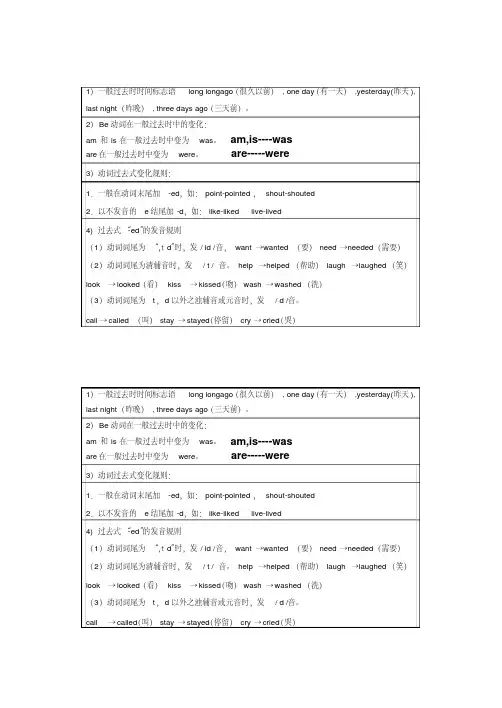
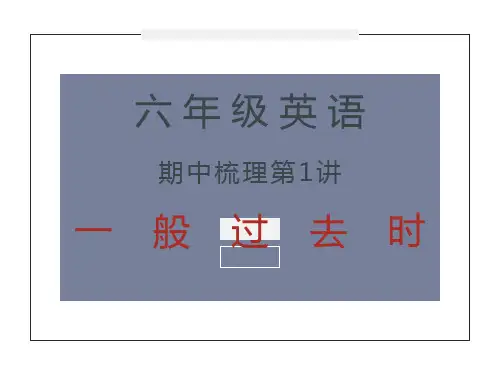
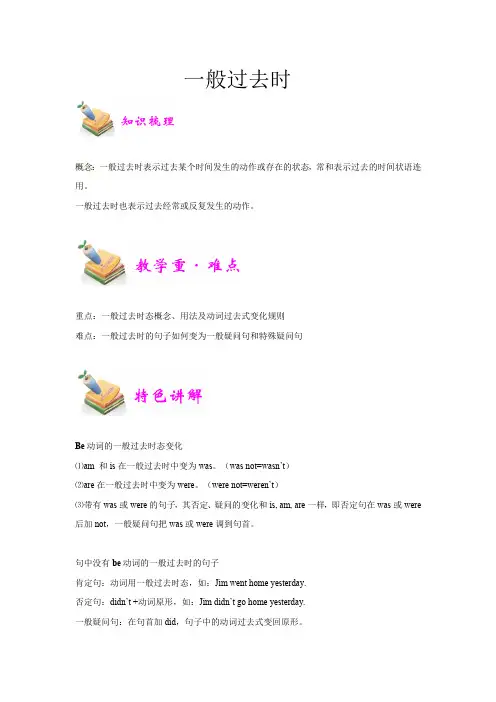
一般过去时概念:一般过去时表示过去某个时间发生的动作或存在的状态,常和表示过去的时间状语连用。
一般过去时也表示过去经常或反复发生的动作。
重点:一般过去时态概念、用法及动词过去式变化规则难点:一般过去时的句子如何变为一般疑问句和特殊疑问句Be动词的一般过去时态变化⑴am 和is在一般过去时中变为was。
(was not=wasn’t)⑵are在一般过去时中变为were。
(were not=weren’t)⑶带有was或were的句子,其否定、疑问的变化和is, am, are一样,即否定句在was或were 后加not,一般疑问句把was或were调到句首。
句中没有be动词的一般过去时的句子肯定句:动词用一般过去时态,如:Jim went home yesterday.否定句:didn’t +动词原形,如:Jim didn’t go home yesterday.一般疑问句:在句首加did,句子中的动词过去式变回原形。
如:Did Jim go home yesterday?特殊疑问句:(1)疑问词+did+主语+动词原形?如:What did Jim do yesterday?Where did Jim go yesterday?⑵疑问词当主语时:疑问词+动词过去式?如:Who went home yesterday?动词过去式变化规则1.一般在动词末尾加-ed,如:pull-pulled, cook-cooked2.以e结尾的动词,直接加-d,如:taste-tasted3.以重读闭音节(即:辅音+元音+辅音)结尾且末尾只有一个元音字母和一个辅音字母的动词,双写末尾的辅音字母,再加-ed,如:stop-stopped4.以“辅音字母+y”结尾的,变y为i,再加-ed,如:study-studied5.不规则动词过去式:am,is-was,are-were, do-did, see-saw, say-said, give-gave,get-got, go-went, come-came, have-had, eat-ate,take-took, run-ran, sing-sang, put-put, make-made,read-read, write-wrote, draw-drew, drink-drank, fly-flew, ride-rode, speak-spoke, sweep-swept, swim-swam, sit-sat一.过去时练习。
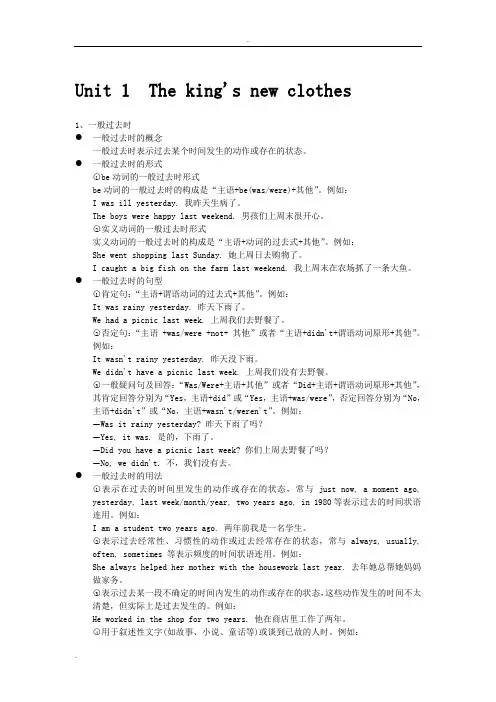
Unit 1 The king's new clothes1、一般过去时●一般过去时的概念一般过去时表示过去某个时间发生的动作或存在的状态。
●一般过去时的形式○1be动词的一般过去时形式be动词的一般过去时的构成是“主语+be(was/were)+其他”。
例如:I was ill yesterday. 我昨天生病了。
The boys were happy last weekend. 男孩们上周末很开心。
○2实义动词的一般过去时形式实义动词的一般过去时的构成是“主语+动词的过去式+其他”。
例如:She went shopping last Sunday. 她上周日去购物了。
I caught a big fish on the farm last weekend. 我上周末在农场抓了一条大鱼。
●一般过去时的句型○1肯定句:“主语+谓语动词的过去式+其他”。
例如:It was rainy yesterday. 昨天下雨了。
We had a picnic last week. 上周我们去野餐了。
○2否定句:“主语 +was/were +not+ 其他”或者“主语+didn't+谓语动词原形+其他”。
例如:It wasn't rainy yesterday. 昨天没下雨。
We didn't have a picnic last week. 上周我们没有去野餐。
○3一般疑问句及回答:“Was/Were+主语+其他”或者“Did+主语+谓语动词原形+其他”,其肯定回答分别为“Yes,主语+did”或“Yes,主语+was/were”,否定回答分别为“No,主语+didn't”或“No,主语+wasn't/weren't”。
例如:—Was it rainy yesterday? 昨天下雨了吗?—Yes, it was. 是的,下雨了。
—Did you have a picnic last week? 你们上周去野餐了吗?—No, we didn't. 不,我们没有去。
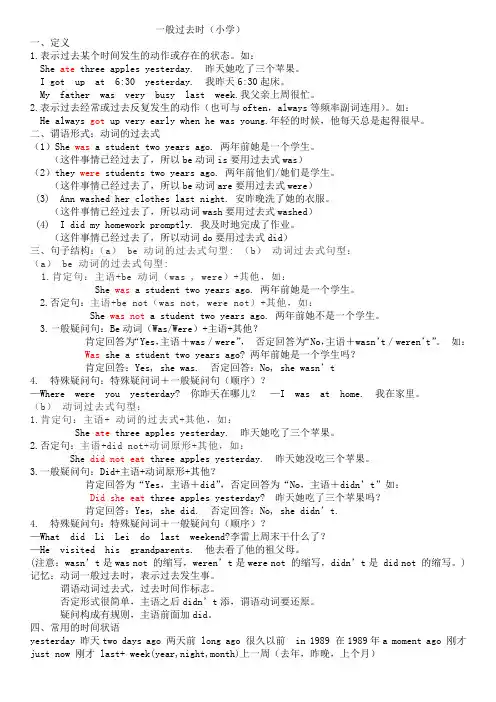
一般过去时(小学)一、定义1.表示过去某个时间发生的动作或存在的状态。
如:She ate three apples yesterday. 昨天她吃了三个苹果。
I got up at 6:30 yesterday. 我昨天6:30起床。
My father was very busy last week.我父亲上周很忙。
2.表示过去经常或过去反复发生的动作(也可与often,always等频率副词连用)。
如:He always got up very early when he was young.年轻的时候,他每天总是起得很早。
二、谓语形式:动词的过去式(1)She was a student two years ago. 两年前她是一个学生。
(这件事情已经过去了,所以be动词is要用过去式was)(2)they were students two years ago. 两年前他们/她们是学生。
(这件事情已经过去了,所以be动词are要用过去式were)(3) Ann washed her clothes last night. 安昨晚洗了她的衣服。
(这件事情已经过去了,所以动词wash要用过去式washed)(4) I did my homework promptly. 我及时地完成了作业。
(这件事情已经过去了,所以动词do要用过去式did)三、句子结构:(a) be 动词的过去式句型: (b)动词过去式句型:(a) be 动词的过去式句型:1.肯定句:主语+be 动词(was , were)+其他,如:She was a student two years ago. 两年前她是一个学生。
2.否定句:主语+be not(was not, were not)+其他,如:She was not a student two years ago. 两年前她不是一个学生。
3.一般疑问句:Be动词(Was/Were)+主语+其他?肯定回答为“Yes,主语+was/were”,否定回答为“No,主语+wasn’t/weren’t”。
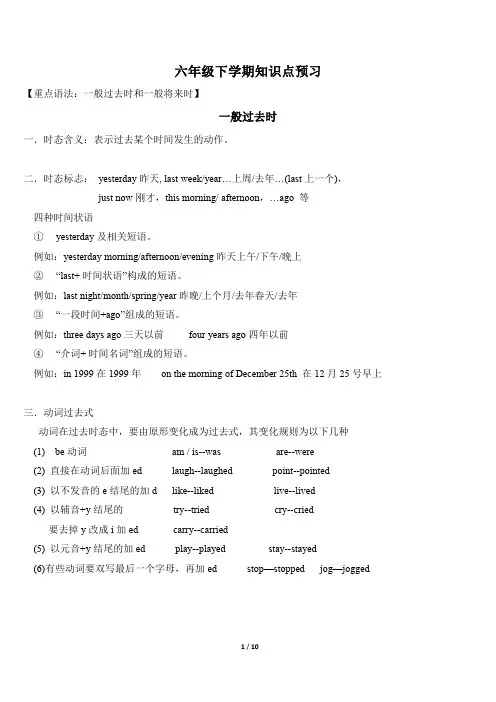
六年级下学期知识点预习【重点语法:一般过去时和一般将来时】一般过去时一.时态含义:表示过去某个时间发生的动作。
二.时态标志:yesterday昨天,last week/year…上周/去年…(last上一个),just now刚才,this morning/afternoon,…ago等四种时间状语①yesterday及相关短语。
例如:yesterday morning/afternoon/evening昨天上午/下午/晚上②“last+时间状语”构成的短语。
例如:last night/month/spring/year昨晚/上个月/去年春天/去年③“一段时间+ago”组成的短语。
例如:three days ago三天以前four years ago四年以前④“介词+时间名词”组成的短语。
例如:in1999在1999年on the morning of December25th在12月25号早上三.动词过去式动词在过去时态中,要由原形变化成为过去式,其变化规则为以下几种(1)be动词am/is--was are--were(2)直接在动词后面加ed laugh--laughed point--pointed(3)以不发音的e结尾的加d like--liked live--lived(4)以辅音+y结尾的try--tried cry--cried要去掉y改成i加ed carry--carried(5)以元音+y结尾的加ed play--played stay--stayed(6)有些动词要双写最后一个字母,再加ed stop—stopped jog—jogged(7)不规则变化(为过去时态中变化的难点,也是考试的重点)原形过去式原形过去式原形过去式do did go went say saidtell told can could get got have had give gave see saw become became fly flew bring brought eat ate take took find found lose lost stop stopped sing sang make made run ran swim swam hold held come came catch caught wear wore read read draw drew write wrote buy bought mean meant drink drank smell smelt keep kept put put throw threw slip slipped feel felt cut cut drive drove四.结构1.肯定句:主语+动词过去式2.一般疑问句:(1)句中含有be动词,将be动词提到句首,Was/Were+主语+……?Yes,…was/were./No,…wasn’t/weren’t.(2)句中无be动词,在句首加Did,动词变原形,Did+主语+动词原形……?Yes,…did./No,…didn’t.3.否定句的修改方法(1)句中含有be动词,直接在be动词后面加not,主语+wasn’t/weren’t…(2)句中无be动词,在动词前加didn’t,动词变原形,主语+didn’t+动词原形4.特殊疑问句:What did+主语+do?一般过去时练习一、请用正确动词形式填空。
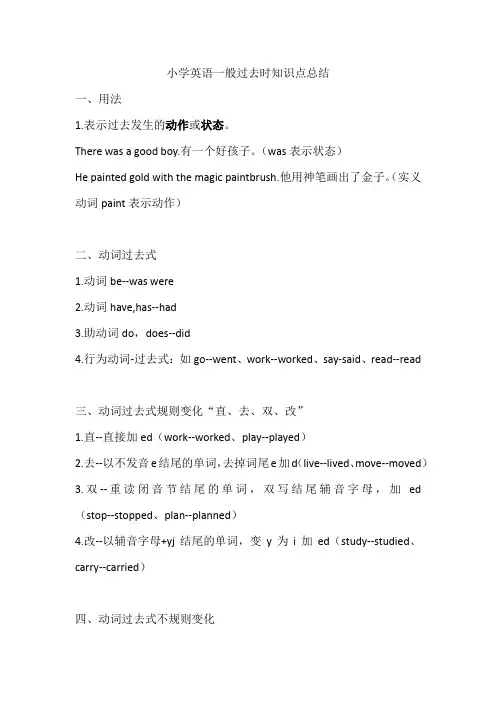
小学英语一般过去时知识点总结一、用法1.表示过去发生的动作或状态。
There was a good boy.有一个好孩子。
(was表示状态)He painted gold with the magic paintbrush.他用神笔画出了金子。
(实义动词paint表示动作)二、动词过去式1.动词be--was were2.动词have,has--had3.助动词do,does--did4.行为动词-过去式:如go--went、work--worked、say-said、read--read三、动词过去式规则变化“直、去、双、改”1.直--直接加ed(work--worked、play--played)2.去--以不发音e结尾的单词,去掉词尾e加d(live--lived、move--moved)3.双--重读闭音节结尾的单词,双写结尾辅音字母,加ed (stop--stopped、plan--planned)4.改--以辅音字母+yj结尾的单词,变y为i加ed(study--studied、carry--carried)四、动词过去式不规则变化1.中间有双e,去e尾加t(保持keep--kept)2.结尾d要变成t(建筑build--built)3.遇见i来,a来替(坐sit--sat)4.若是买来想打仗,战甲ought要换上(买buy--bought、带来bring--brought)5.教书抓住刷流氓,制服aught来帮忙(教teach--taught、catch--taught)6.ow/aw凑热闹,变成ew最时尚(知道know--knew、生长grow--grew)7.“放、读、切、让”过去原形都一样(放put--put、切cut--cut、让let--let、读read/ri:d/--read/red/)五、过去式+ed的发音“清清浊浊,元后浊,td后面读id”1.在以清辅音结尾的规则动词后,ed读作/t/(worked//)2.在以浊辅音或元音结尾的规则动词后,ed读作/d/3.在以/t/或/d/结尾的规则动词后,ed读作//六、与过去时连用的时间词1.ago家族(两分钟之前two minutes ago、五年之前five years ago、很久很久之前long long ago)st家族(上周last week、上个月last month、去年冬天last winter)3.yesterday家族(昨天早晨yesterday morning、前天the day before yesterday)4.that家族(那天早上that morning、那天that day、那年that year)5.其他(刚才just now、那些天in those days、在1980年in 1980、那是at that time、以前once upon a time)七、句式变化1、肯定句变否定句:+not表动作(无be,借助did,did+ not)表状态(be+not)2、肯定句变一般疑问句:一挪二改表动作(一挪:有be挪be,没be借did,先借再挪;二改:人称一变二,句号变问号)表状态(一挪:be挪到句首;二改:人称一变二,句号变问号)3、对划线部分提问:一找二挪三改表动作(一找:找到划线部分对应的疑问词,将疑问词放到句首;二挪:有be动词的挪be,没有be动词的借助did,先挪再借,挪到疑问词后,其他照抄;三改:人称一变二,句号变问号)表状态(一找:找到划线部分对应的疑问词,将疑问词放到句首;二挪:be挪到疑问词后,其他部分照抄;三改:人称一变二,句号变问号。
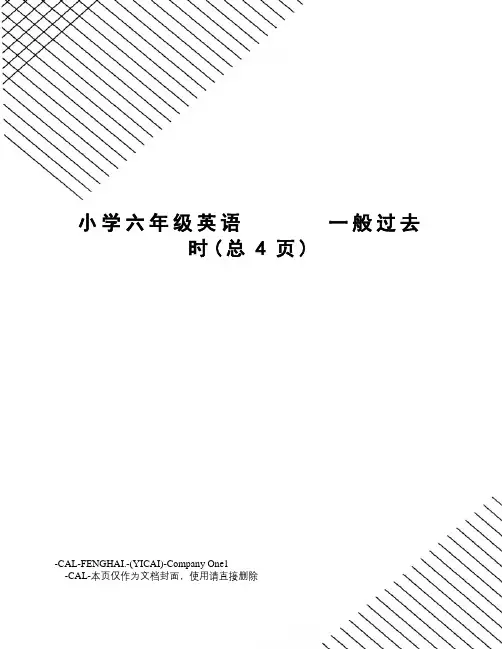
小学六年级英语一般过去时(总4页)-CAL-FENGHAI.-(YICAI)-Company One1-CAL-本页仅作为文档封面,使用请直接删除第十七讲一般过去时一. 概念一般过去时表示过去某个时间发生的动作或存在的状态,常和表示过去的时间状语连用。
一般过去时也表示过去经常或反复发生的动作。
例句:watched TV last night.我昨天晚上看电视。
did you do yesterday?你昨天做了什么?went to Beijing last year.他们去年去了北京。
二.用法1.表示过去发生的动作或状态,通常会有明确的表示过去的时间状语。
I went to the zoo yesterday.I stayed up last night.2.叙述过去连续发生的动作或状态。
This morning , I got up early , went out for a walk , then came back and cooked for my family .3.表示过去某一段不确定的时间内发生的动作或状态。
He worked in the store for 5 years.三.Be动词在一般过去时中的变化1. am 和is在一般过去时中变为was。
(was not=wasn't)2. are在一般过去时中变为were。
(were not=weren't)3. 带有was或were的句子,其否定、疑问的变化和is, am, are一样,即否定句在was或were后加not,一般疑问句把was或were调到句首。
四.句中没有be动词的一般过去时的句子1.否定句:didn't +动词原形,如:Jim didn't go home yesterday.2.一般疑问句:在句首加did,句子中的动词过去式变回原形。
如:Did Jim go home yesterday?3.特殊疑问句:疑问词+一般疑问句?如:What did Jim do yesterday?五.动词过去式变化规则1.一般在动词末尾加-ed,如:pull-pulled, cook-cooked2.结尾是e加d,如:taste-tasted3.末尾是辅音字母加一个元音字母和一个辅音字母的重读闭音节,应双写末尾的辅音字母,再加-ed,如:stop-stopped4.以“辅音字母+y”结尾的,变y为i,再加-ed,如:study-studied六.真题再现( ) 1. The boy the tree last week.A. is wateringB. watersC. watered2. I _____(see) his name in the newspaper yesterday.因为句中出现了表示过去的时间状语last week和yesterday,所以正确答案分别为:1. C精点精练一、用动词的适当形式填空。

一般过去时讲解一. 概念一般过去时表示过去某一时间发生的动作或存在的状态。
常和yesterday, last week(year), three days(weeks) ago,in 2003等时间状语连用。
二.一般过去时有下面三种用法:1.表示过去的动作或状态:I bought the hat yesterday.昨天我买了这顶帽子。
He was at school last Monday.上星期一他在上学。
2.表示过去的习惯动作:When he was at school, he wrote a dairy every day.他上学时,每天写一篇日记。
I used to get up early.我以前习惯早起。
注:"used to+动词原形"表示过去某一段时间内有规律的习惯。
3.表示过去发生的一连串的动作:The students got up early in the morning, did their morning exercise, fetched water, swept the floor and then studied English.学生们一早起来,做早操,打水,扫地,然后学英语。
三. 构成(1)主语+be动词(was,were)+其它。
当主语为第一、三人称单数时,be动词用was,主语为其它人称时,be 动词一律用were。
如:I(He, She) was in Grade 5 last year.They were students two years ago.(2) 主语+行为动词过去式(无人称和数的变化)。
如:We played football yesterday. Mr Li went to Shanghai last Sunday.3.变化形式:A.一般在动词词尾加ed。
例如:play—played clean—cleaned visit—visitedB.动词末尾字母是e的,在e后直接加d。
1. 6A U5同步与提高Part 1 课文ReviewOpen Day programmeMiss Guo and her students are p_____1_____ the programme for their Open Day.The students’ parents will arrive at two o’clock. Miss Guo willmeet them at the e_____2_____. F_____3_____, they will visit theclassroom at two fifteen. N_____4_____, they’ll look at the classp_____5_____ in the Arts and Crafts room at two thirty.T_____6_____ they’ll listen to the school choir in the h_____7_____at three ten.After that, they’ll look at the English Club n_____8_____ in the l_____9_____ at four. F_____10_____, they’ll have tea and cakes with the teachers in the music room at four twenty-five.Part 2 根据音标写单词6A U5Vocabulary(牛津)英文音标词性中文['prəʊgræm]n.活动安排['entr(ə)ns]n.入口处['kwaɪə]n.合唱队['nəutisbɔ:d]n.布告栏['peər(ə)nt]n.父或母[ə'raɪv]v.到达[fɜːst]adv.首先['klɑːsmeɪt]n.教室[nekst]adv.紧接着,随后[prəˈdʒekt]n.习作项目[krɑːft]n.工艺[klʌb]n.俱乐部['faɪnəlɪ]adv.最后Part 3 词汇语法复习(2)6A U5重难点1. entrance n. 入口I will wait for you ________ ________ ________. 我会在入口处等你。
一般过去时知识点大全小学一般过去时是英语中最常用的时态之一,用来表示过去发生或存在的动作、状态或习惯。
在小学阶段,学生需要掌握一般过去时的基本用法和规则,以便正确运用。
下面是一般过去时知识点的详细介绍:1. 一般过去时的构成:一般过去时是通过在动词原形后面直接加上“-ed”来构成的。
例如:play→played,paint→painted。
2. 一般过去时的肯定句:一般过去时的肯定句的结构是:主语 + 动词过去式 + 其他。
例如:I played soccer with my friends yesterday.我昨天和我的朋友们踢足球。
3. 一般过去时的否定句:一般过去时的否定句的结构是:主语 + did not + 动词原形 + 其他。
例如:We did not watch a movie last night.我们昨晚没看电影。
4. 一般过去时的疑问句:一般过去时的疑问句的结构是:Did + 主语 + 动词原形 + 其他?例如:Did you eat breakfast this morning?你今天早上吃早饭了吗?5. 一般过去时中的时间状语词:一般过去时通常与过去的时间状语词连用,表示动作或事件发生的具体时间。
例如:yesterday(昨天)、last week(上周)、two days ago(两天前)等。
6. 一般过去时中的特殊动词:一般过去时中有一些特殊的动词形式需要注意:- be动词的过去式形式是was(单数第一人称和单数第三人称)和were(其他人称和复数形式)。
- do动词的过去式形式是did。
7. 一般过去时中的规则动词和不规则动词:在一般过去时中,大部分动词都是按照规则进行变化的,即直接在动词原形后加上“-ed”。
而一些常见的动词则有自己的过去式形式,需要记住,其中包括go(went)、see(saw)、eat(ate)等。
8. 一般过去时与现在时态的对比:一般过去时表示的是过去发生的动作或状态,与现在时态形成对比。
第一讲过去式一概念表示在过去某个时间里所发生的动作或存在的状态。
通常在句子里找到表示过去时间的词或词组。
如:yesterday, yesterday morning, yesterdayafternoon, yesterday evening, the day before yesterday, last night,last week, last month, last year, a moment ago, just now, two days ago,a week ago, in 1990等。
如:I went to bed at eleven last night. 昨晚我11:00睡觉。
二动词过去式的构成规律(一)规则动词的过去式1,一般情况下,在动词原形后面加-ed;Look--- looked play----played start--- started visit—visited2, 以不发音e结尾的动词,在词尾直接加-d;Live—lived use---used3, 以“辅音字母+y”结尾的动词,先将y 改成i,再加–ed;Study---studied try—tried fly---flied4,以重读闭音节(即辅音+元音+辅音)或 r 音节结尾,末尾只有一个辅音字母的动词,要先双写这个辅音字母后,再加–ed。
Stop---stopped plan---planned preferred(二)不规则动词的过去式1 改变动词中的元音;Begin--- began drink---drank come---came eat---ateGrow---grew run---ran know---knew win---won speak---spokeTake ---took write ---wrote get---got2 变词尾的-d 为-tBuild---built lend---lent send---sent spend--spent bend--bent3 与动词原形一样;Cut---cut put---put cost----cost hurt---hurt shut---shut4 变-ay 为—aid(少数动词)Say---said pay---paid lay---laid5 采用不同词根;Sell--- sold teach----taught buy----bought6 其他Am/is ---was are---were have/has--- had do---did二加–ed 后的读音方法1 ed加在清辅音后面读/t/Finished/-t/ help /-t/ asked/-t/2 ed 加在浊辅音或元音结尾的,读/d/Played/-d/ lived/-d/ enjoyed/-d/3 ed 加在/t/或/d/后面,读/id/Wanted /-tid/ needed/-did/ visited /-tid/过去时练习:写出下列动词的过去式Is\am______ fly___ plant_____ are_____ drink_____Play ______ go____ make______ does_____ dance_____Worry______ ask____ taste_______ eat_____ draw_____Put_____ throw______ kick_______ pass_____ do______用所给动词的适当形式填空1 We_____ (live) in Japan last year.2 Susan_____(stop) the car on the street yesterday.3 My mother____(clean) my room and I _____( study) for the English testlast Sunday.4 What____ you_____(do) last night?5 On Saturday morning I ____(play) football二用括号内所给动词的适当形式填空(1)May_____(finish) her homework very late yesterday evening.(2)Han Mei_____(bring) her pet to the park that day.(3)His father______(buy) a new computer for him last week(4)Miss Du______ (walk) to work every day last term.(5)We____(move) to Shenyang 8 years ago.(6)_____ you _________(have) bread for breakfast this morning?(7)She_______(give) me a nice present last night.(8)The police______(stop) the car and_____(catch) the thief (小偷) just now.(9)Tom ____(carry)water for the old man last Saturday.(10)Uncle Wang______(come)into the room and______(find) something to eat.(11)Lily______(study)in the classroom for two hours and then____(leave).(12)Jimmy______(do) a lot today. He______(go) shopping and_____(cook)supper.(13)We_____(go) to the cinema last night. The film_____(be)very good.(14)What time ______you________(get) to school this morning?三句子变化(一)一般过去时的一般疑问句1.把 was, were放在句首,其余位置不变。
以下是⽆忧考为⼤家整理的关于⼩学六年级英语⼀般过去时的⽤法总结的⽂章,供⼤家学习参考!1. 表⽰过去某个特定时间发⽣的动作或存在的状态 这种情况常下与“just now刚才,yesterday昨天,last year去年,in 1999在1999年,two days ago两天之前”等表⽰过去的时间状语连⽤。
She suddenly fell ill yesterday. 她昨天突然病倒了。
We didn't have classes last week. 上周我们没有上课。
? ⼀般过去时亦可与“today今天,this week这周,this month这个⽉,this year今年”等表⽰现阶段时间状语连⽤。
如: Did you meet him today? 今天你看见他了吗? 2. 表⽰过去的习惯性或经常发⽣的动作 ⼀般过去时表⽰过去经常或反复发⽣的动作,常和“often经常,always总是,once a week⼀周⼀次”等表⽰频度的时间状语连⽤。
I went to the cinema once a week when I was at school. 我上学时每周去看⼀场电影。
When I was in the countryside, I often walked by the riverside. 我在乡下时经常在河边散步。
? 表⽰过去⼀段时间内经常或反复发⽣的动作,也可以⽤would+动词原形或⽤used to加动词原形: When he was young, he would go skating every winter. 他年轻时每年冬天都要去滑冰。
Mrs Smith used to have a big house in down town. 史密斯夫⼈在城⾥曾经有⼀座⼤房⼦。
3. 在条件、时间状语从句中代替⼀般过去将来时 They said they would let me know as soon as they got there. 他们说只要他们⼀到达那⼉就会马上让我知道的。
第十七讲一般过去时
一. 概念
一般过去时表示过去某个时间发生的动作或存在的状态,常和表示过去的时间状语连用。
一般过去时也表示过去经常或反复发生的动作。
例句:
1.I watched TV last night.
我昨天晚上看电视。
2.What did you do yesterday?
你昨天做了什么?
3.They went to Beijing last year.
他们去年去了北京。
二.用法
1.表示过去发生的动作或状态,通常会有明确的表示过去的时间状语。
I went to the zoo yesterday.
I stayed up last night.
2.叙述过去连续发生的动作或状态。
This morning , I got up early , went out for a walk , then came back and cooked for my family .
3.表示过去某一段不确定的时间内发生的动作或状态。
He worked in the store for 5 years.
三.Be动词在一般过去时中的变化
1. am 和is在一般过去时中变为was。
(was not=wasn't)
2. are在一般过去时中变为were。
(were not=weren't)
3. 带有was或were的句子,其否定、疑问的变化和is, am, are一样,即否定句在was或were后加not,一般疑问句把was或were调到句首。
四.句中没有be动词的一般过去时的句子
1.否定句:didn't +动词原形,如:
Jim didn't go home yesterday.
2.一般疑问句:在句首加did,句子中的动词过去式变回原形。
如:
Did Jim go home yesterday?
3.特殊疑问句:疑问词+一般疑问句?如:
What did Jim do yesterday?
五.动词过去式变化规则
1.一般在动词末尾加-ed,如:pull-pulled, cook-cooked
2.结尾是e加d,如:taste-tasted
3.末尾是辅音字母加一个元音字母和一个辅音字母的重读闭音节,应双写末尾的辅音字母,再加-ed,如:stop-stopped
4.以“辅音字母+y”结尾的,变y为i,再加-ed,如:study-studied
六.真题再现
( ) 1. The boy the tree last week.
A. is watering
B. waters
C. watered
2. I _____(see) his name in the newspaper yesterday.
因为句中出现了表示过去的时间状语last week和yesterday,所以正确答案分别为:1. C
2.saw
精点精练
一、用动词的适当形式填空。
1. It __________ (be) Ben's birthday last Friday.
2. We all __________ (have) a good time last night.
3. He __________ (jump) high on last Sports Day.
4. She likes __________newspapers, but she __________ a book yesterday. (read)
5. He __________ football now, but they __________ basketball just now. (play)
6. Jim's mother __________ (plant) trees just now.
7. __________ they __________ (sweep) the floor on Sunday? No, they __________.
二、句型转换。
1. Tom took some photos on the Sports day.
否定句:________________________________________________
一般疑问句:____________________________________________
2. Nancy went to school early.
否定句:________________________________________________
一般疑问句:____________________________________________
3. We sang some English songs.
否定句:________________________________________________
一般疑问句:____________________________________________
4. They were in his pocket.
否定句:________________________________________________
一般疑问句:____________________________________________
肯定回答:______________________________________________
模拟预测
一、用动词的适当形式填空。
1. It __________ (be) the 2nd of November yesterday.
Mr White __________ (go) to his office by car.
2. Gao Shan __________ (put) the book on his head a moment ago.
3. What __________ you __________ just now? I __________ some housework. (do)
4. They __________ (make) a kite a week ago.
5. I want to __________ apples. But my dad __________ all of them last month. (pick)
6. __________ he __________ the flowers this morning? Yes, he __________. (water)
7. The students often __________ (draw) some pictures in the art room.
二、中译英。
1. 我的故事书刚才还在手表旁边。
My storybook __________ beside the watch ___________ _________.
2. 他们的外套上个礼拜放在卧室里了。
Their __________ __________ in the bedroom __________ __________.
3. 格林先生去年住在中国。
Mr Green __________ __________ China __________ __________.
4. 昨天我们参观了农场。
We __________ a farm __________.
5. 他刚才在找他的钢笔。
He ______ ______ his _________ _______ now.
6. 他上个周末走亲访友了吗?是的。
__________ he __________his _________ and __________ last __________?
Yes, he __________.
7. 你们上个儿童节做了什么?我们参观了动物园。
What __________ you __________ last __________ __________? We __________ the zoo.
8. 你上周在哪儿?在番禺。
Where __________ you __________ __________? I __________ in Panyu.。